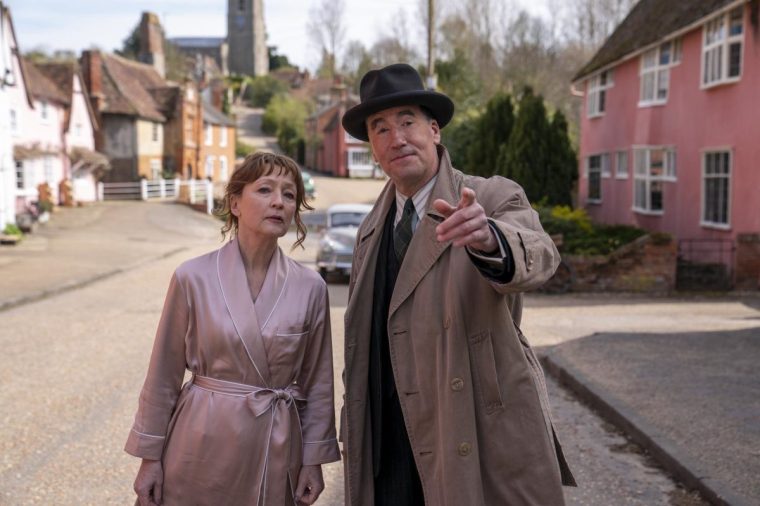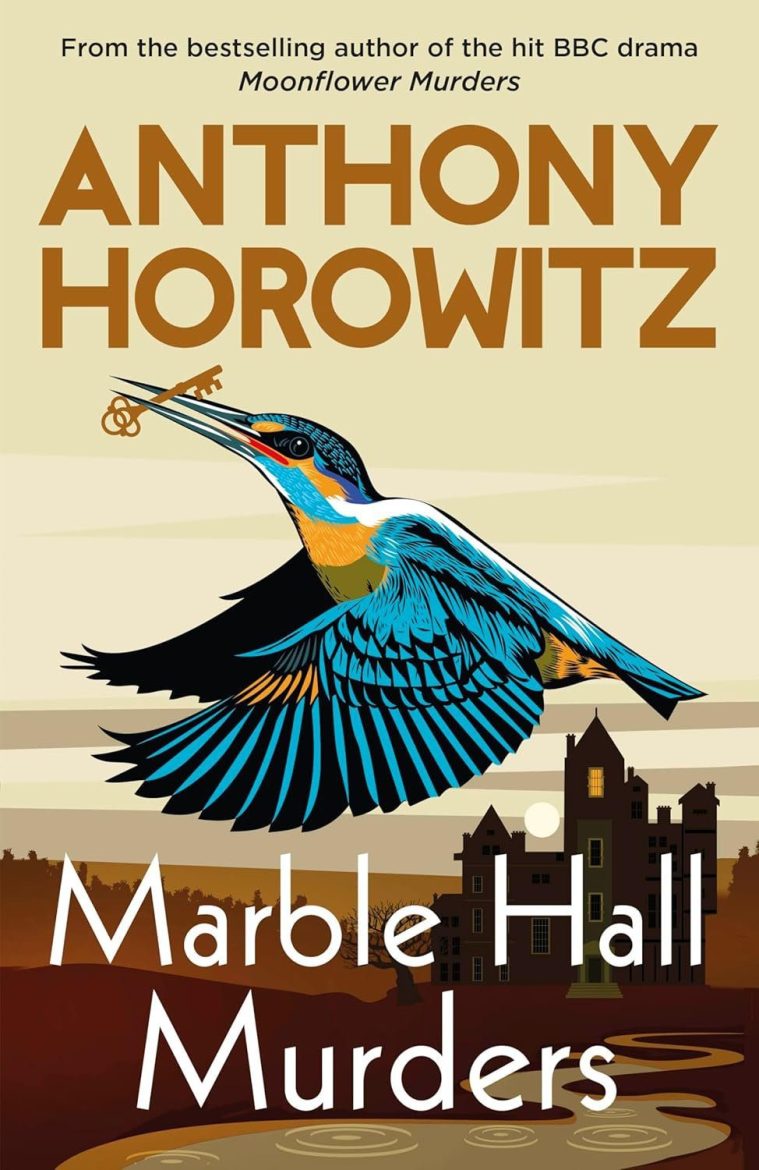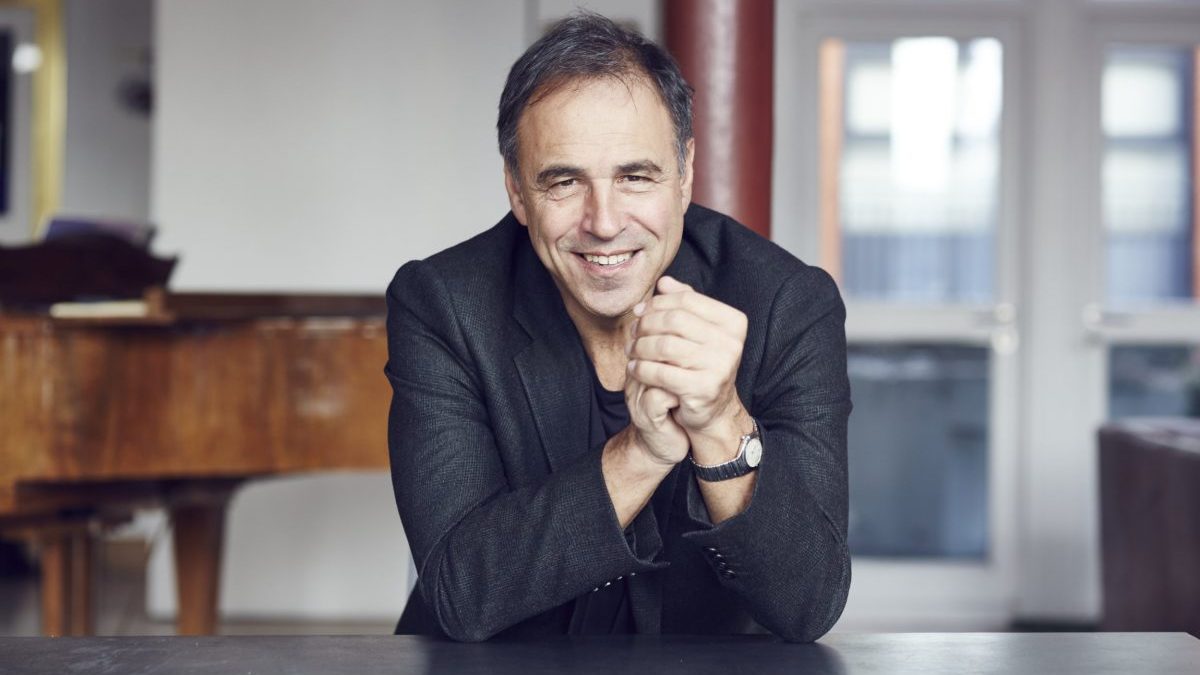Anthony Horowitz is feeling “the passage of time”. He has just celebrated his 70th birthday, and next month will mark 25 years since his first Alex Rider, the famed teenage spy series that gets children into reading and has sold almost 20 million copies worldwide.
His new novel, Marble Hall Murders – the third in a trilogy of Golden-Age style crime series featuring the murder-solving book editor, Susan Ryeland – marks the closing of another chapter.
“I have a feeling that’s the end” of the series, says Horowitz, over Zoom from behind his writing desk at his home in Richmond, west London. There are bookshelves stacked with his novels framing his head, and he wears his trademark baseball cap – black today, to match his T-shirt. “I like trilogies and maybe that’s enough thinking up variations on the book inside the book,” he adds, referring to the metafictional trademark of the Susan Ryeland stories.
He hadn’t actually planned to follow Magpie Murders (2016) and Moonflower Murders (2020) with a third instalment. But that changed after he turned both books into hit dramatisations for the BBC, where his wife, Jill Green – who he’s been married to since 1988 – is the executive producer.
On the last day of filming Moonflower Murders, in December 2023, Leslie Manville, who plays Ryeland, had such a great time she asked Horowitz to do a third – then the whole crew chimed in, too. “I said, ‘Well, I’ll need to adapt a novel but I haven’t written one.’ So I had to write a 550-page novel very, very quickly, and then adapt it into a TV screenplay, also very quickly. By the end, I felt my head had shrunk so my brain was the size of a walnut. But I think the urgency of it led me to have fun.”
When we talk, it’s week three of filming Marble Hall Murders. “I’m watching the rushes [raw footage] of the show and it’s got an energy and a pizzazz that I think is just extraordinary,” he says. I can vouch for the book being a fun read, too. Susan Ryeland is working on a final book about the celebrated detective Atticus Pünd, and – without revealing too much of the Magpie Murders twist – the topic of continuation novels comes up, in the vein of one of Horowitz’s Bond or Sherlock Holmes stories.
“It’s strange how characters can become bigger than their authors, but popular fiction is absolutely crowded with them,” writes Horowitz as protagonist Ryeland.
 Leslie Manville as Susan Ryeland and Tim McMullan as Atticus Pünd in ‘Magpie Murders’ (Photo: BBC/Eleventh Hour Films/Nick Wall)
Leslie Manville as Susan Ryeland and Tim McMullan as Atticus Pünd in ‘Magpie Murders’ (Photo: BBC/Eleventh Hour Films/Nick Wall)
In our call, he adds: “You don’t talk about the Anthony Horowitz books so much as the Alex Rider books. Characters do, as it were, outlive their authors, and are more interesting. After all, their creators just sit in a room, scribbling.”
He has “scribbled” more than 60 books in his near-five decade career – his first, The Sinister Secret of Frederick K.Bower, in 1979. He later embarked on his Susan Ryeland metafictional trilogy because he wanted to write about his career as a writer.
He attempted a non-fiction version, with an eye to apeing one of his favourite books, William Goldman’s Adventures in the Screen Trade, but got bored after three pages. “So, I thought, ‘Why can’t I write a murder mystery that poses questions, such as: why is murder entertainment when it’s a book? I have been using the murder-mystery format – the ‘whodunnit’ – in ways that have never been done before.”
Just don’t call his work “cosy crime”. He says: “I have a real dislike of the phrase ‘cosy crime’. A crime is never cosy. You don’t stick a knife somebody or shoot them in a cosy manner. Crime is horrible. I’m writing metafiction. You are both reading a book and reading a book about the book at the same time.”
The cosy crime genre is successful, all the same – especially, I point out, for celebrities-turned-authors, such as Richard Osman and Reverend Richard Coles. Where does he stand on celebs muscling in on his turf?
“I’ve always had a certain envy, shall we say, of famous people who move into either children’s books or into crime fiction. I’ve had to work terribly hard to get noticed in this world. But if you are a celebrity you immediately suck up all the publicity, book space, and everything else,” he says. “But this is envy, it’s not judgment.” His ethos is: if the books are good, well, good luck to the writer. “Richard Osman’s book was very, very good… But if a celebrity writes a bad children’s book, and that children’s book takes up a space, I think it’s fair enough to say, ‘Damn!’”
Horowitz is a fast, forthright talker with firm views on everything from smartphones in schools (“It’s a no-brainer; they should go nowhere near schools”) and VAT on private schools (“That’s performative, not helpful”) to arts funding. Hay Festival’s decision to axe its sponsorship deal with Baillie Gifford, over the investment management company’s links with fossil fuel firms, was “retrogressive, irresponsible, and entirely selfish”. He hails Lisa Nandy, the UK’s Culture Secretary, for lambasting the boycott movement that has targeted recent literature festivals. “She’s doing a good job, I think.”
 Horowitz hadn’t planned to follow Magpie Murders (2016) and Moonflower Murders
Horowitz hadn’t planned to follow Magpie Murders (2016) and Moonflower Murders
(2020) with a third instalment
Next, we’re onto the reading crisis among young people – a survey in 2024 by the National Literacy Trust shows children’s reading enjoyment has fallen to its lowest level in almost two decades. “If children don’t read, then, eventually, the whole oasis will dry out,” he says.
Horowitz is riled about the tyranny of the screen. “Smartphones are doing such terrible damage to their concentration. I would be happy to see a world where smartphones were kept from young people until they were 16. Like alcohol, sex, and other things which are not necessarily bad for you, but can be bad for you when you’re young,” he says, without a shred of faith that the Government will impose any form of restrictions.
That said, he is anxious not to come across as “aggressive or restrictive”. He adds: “I don’t like bans. I don’t like censorship. I don’t like things that prevent people from doing what they want. But I do believe in safeguarding young people.”
In 2023, in the wake of the furore over Puffin editing Roald Dahl’s novels to remove negative references to weight, mental health, violence, gender and race, Horowitz told a literary festival audience that he wouldn’t be writing any more “ugly villains”. (The eponymous Granny in Horowitz’s 2015 children’s horror book was not only “horribly mean” but also “physically repulsive”, according to the blurb.) What else has he changed when he writes? “When I am describing a character, I am very painfully aware of certain words and certain tropes which are no longer considered to be acceptable.
“While I am against writers being bullied into submission, or being censored, or rewritten – especially writers who are no longer alive – I think it is a foolish writer who ignores the way society is going. It seems not unreasonable that [when writing] a description of somebody of a different ethnicity, nationality, or gender, I should be aware of what and what is not now considered acceptable.”
He adds: “I will write what I want to write, but I’m not stupid. I am not self-destructive. I’ve been writing for a very long time. I do not wish to see myself under siege.”
With another six books to come in his Hawthorne and Horowitz series – plus “other books” he is in discussions about with his publisher – time may well be passing, but he is making the most of it. You’ll keep writing, I ask? “Until the end. ‘Til the end,” he repeats, with a smile.
‘Marble Hall Murders‘, by Anthony Horowitz (Century, £22) is out now
